Data entry clerks are fundamental in managing information by entering data into databases and maintaining accurate records. Their role is crucial in ensuring that data is input correctly, updated, and easily accessible.
Key skills for a data entry clerk include fast typing abilities, attention to detail, and familiarity with data programs and software such as Microsoft Excel or database management systems. Additionally, organizational and time management skills are important to handle high volumes of tasks efficiently.
Candidates can write these abilities in their resumes, but you can’t verify them without on-the-job Data Entry Clerk skill tests.
In this post, we will explore 7 essential Data Entry Clerk skills, 10 secondary skills and how to assess them so you can make informed hiring decisions.
Table of contents
7 fundamental Data Entry Clerk skills and traits
The best skills for Data Entry Clerks include Typing Speed, Attention to Detail, Basic Computer Skills, Time Management, Data Organization, Communication Skills and Confidentiality.
Let’s dive into the details by examining the 7 essential skills of a Data Entry Clerk.
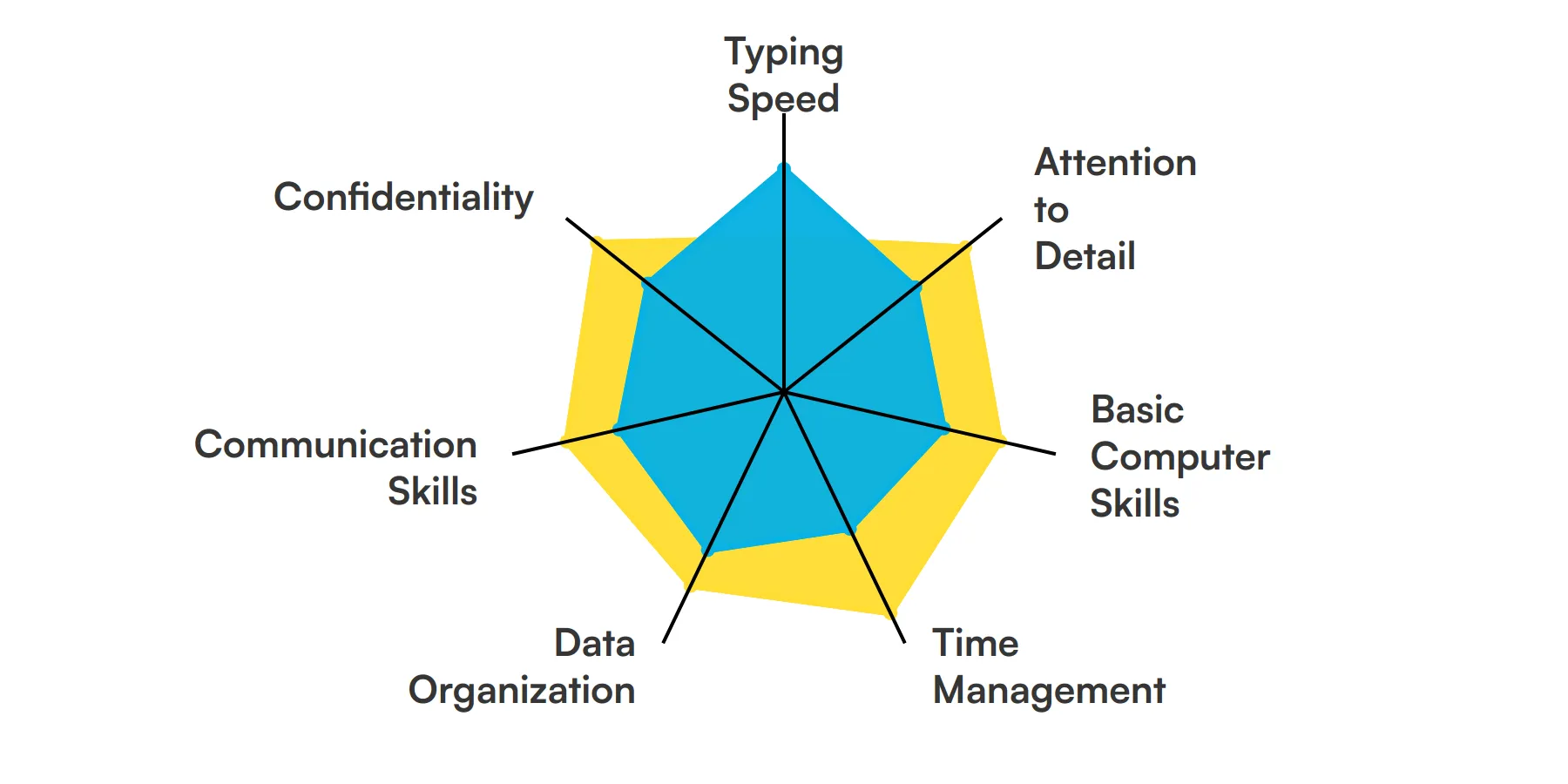
Typing Speed
A data entry clerk must have a high typing speed to input large volumes of data quickly. This skill ensures that tasks are completed within deadlines, making the workflow more efficient.
For more insights, check out our guide to writing a Typist Job Description.
Attention to Detail
Accuracy is paramount in data entry. Attention to detail helps in minimizing errors, ensuring that the data entered is correct and reliable. This skill is crucial for maintaining data integrity.
Basic Computer Skills
Proficiency in using computers and basic software like Microsoft Office is essential. A data entry clerk often works with spreadsheets and databases, so knowing how to navigate these tools is important.
Time Management
Managing time effectively allows a data entry clerk to handle multiple tasks and meet deadlines. This skill helps in prioritizing tasks and ensuring that all data entry work is completed on schedule.
Data Organization
Organizing data systematically makes it easier to retrieve and analyze. A data entry clerk should be adept at categorizing and storing data in a structured manner to maintain order and accessibility.
Communication Skills
Clear communication is necessary for understanding instructions and collaborating with team members. A data entry clerk often needs to clarify data-related queries and report issues effectively.
Check out our guide for a comprehensive list of interview questions.
Confidentiality
Handling sensitive information requires a high level of confidentiality. A data entry clerk must ensure that data is protected and not disclosed to unauthorized parties, maintaining data security.
10 secondary Data Entry Clerk skills and traits
The best skills for Data Entry Clerks include Basic Math Skills, Problem-Solving, Multitasking, Adaptability, Team Collaboration, Customer Service, File Management, Keyboard Shortcuts, Basic IT Troubleshooting and Documentation.
Let’s dive into the details by examining the 10 secondary skills of a Data Entry Clerk.
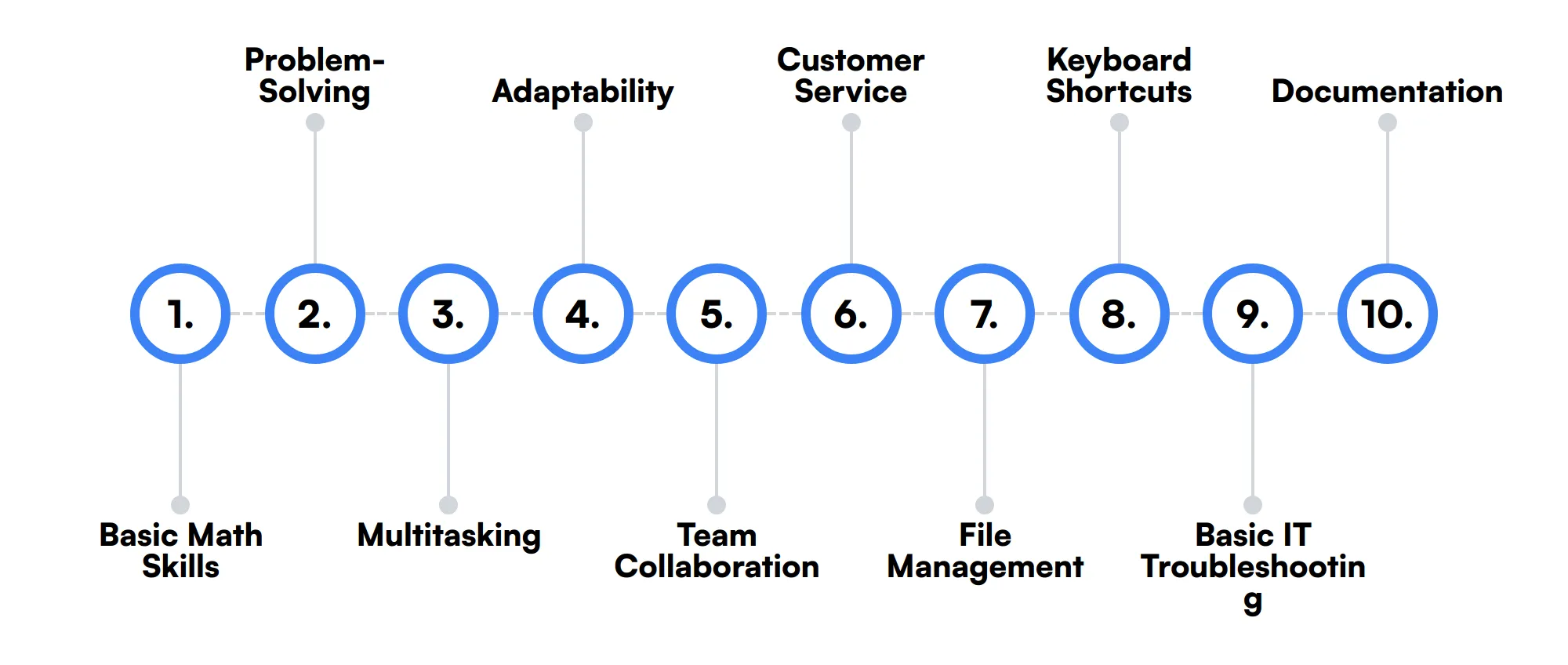
Basic Math Skills
Understanding basic arithmetic is useful for tasks that involve numerical data. This skill helps in verifying and entering numerical information accurately.
Problem-Solving
Encountering and resolving data discrepancies is a common task. Problem-solving skills enable a data entry clerk to identify issues and find effective solutions quickly.
Multitasking
Handling multiple data entry tasks simultaneously requires the ability to multitask. This skill helps in managing various responsibilities without compromising on accuracy.
Adaptability
Being adaptable allows a data entry clerk to adjust to new software, processes, and data types. This flexibility is important in a dynamic work environment.
Team Collaboration
Working well with others is important for a data entry clerk, especially in larger teams. Collaboration skills help in sharing information and completing tasks more efficiently.
Customer Service
Interacting with clients or other departments may be part of the job. Good customer service skills ensure that these interactions are positive and productive.
File Management
Knowing how to manage and organize files is important for keeping data accessible and secure. This skill helps in maintaining a well-organized digital workspace.
Keyboard Shortcuts
Familiarity with keyboard shortcuts can significantly speed up data entry tasks. This skill helps in improving efficiency and reducing the time spent on repetitive actions.
Basic IT Troubleshooting
Understanding basic IT troubleshooting can help resolve minor technical issues quickly. This skill ensures that data entry work is not delayed due to technical problems.
Documentation
Keeping accurate records of data entry processes and changes is important. Documentation skills help in maintaining a clear audit trail and ensuring transparency.
How to assess Data Entry Clerk skills and traits
Assessing the skills and traits of a Data Entry Clerk involves more than just looking at their resume. While a resume can provide a snapshot of their experience, it doesn't give you a complete picture of their proficiency in key areas such as typing speed, attention to detail, and time management. To truly understand a candidate's capabilities, you need to evaluate their practical skills and how they handle real-world tasks.
One effective way to do this is through skills-based assessments. These tests can help you measure a candidate's typing speed, their ability to organize data, and their proficiency with basic computer skills. Additionally, assessments can gauge their attention to detail and how well they manage their time. Adaface assessments are designed to provide a comprehensive evaluation, helping you improve the quality of hires by 2x and reduce screening time by 85%.
By using targeted assessments, you can also evaluate a candidate's communication skills and their understanding of confidentiality, which are crucial for the role of a Data Entry Clerk. This approach ensures that you are not just hiring someone who looks good on paper, but someone who can excel in the day-to-day responsibilities of the job.
Let’s look at how to assess Data Entry Clerk skills with these 5 talent assessments.
Typing Online Test
Typing Online Test measures a candidate's typing ability and speed (words per minute). This test is commonly used to assess an applicant's suitability for positions requiring typing skills.
The test evaluates skills such as typing speed, accuracy, proofreading, and formatting. It includes 5 typing questions designed to gauge how quickly and accurately a candidate can type.
Successful candidates demonstrate high typing speed and accuracy, along with strong proofreading and formatting skills.

Attention To Detail Test
Attention To Detail Test evaluates a candidate's ability to focus on tasks and their thoroughness in detail-oriented work. This test helps identify candidates who ensure high-quality work while processing information.
The test covers skills such as following instructions, verifying data, checking consistency, proofreading, and identifying mistakes. It includes 15 multiple-choice questions that assess a candidate's attention to detail.
Candidates who score well on this test are adept at detecting typos and inconsistencies, ensuring data accuracy and quality.
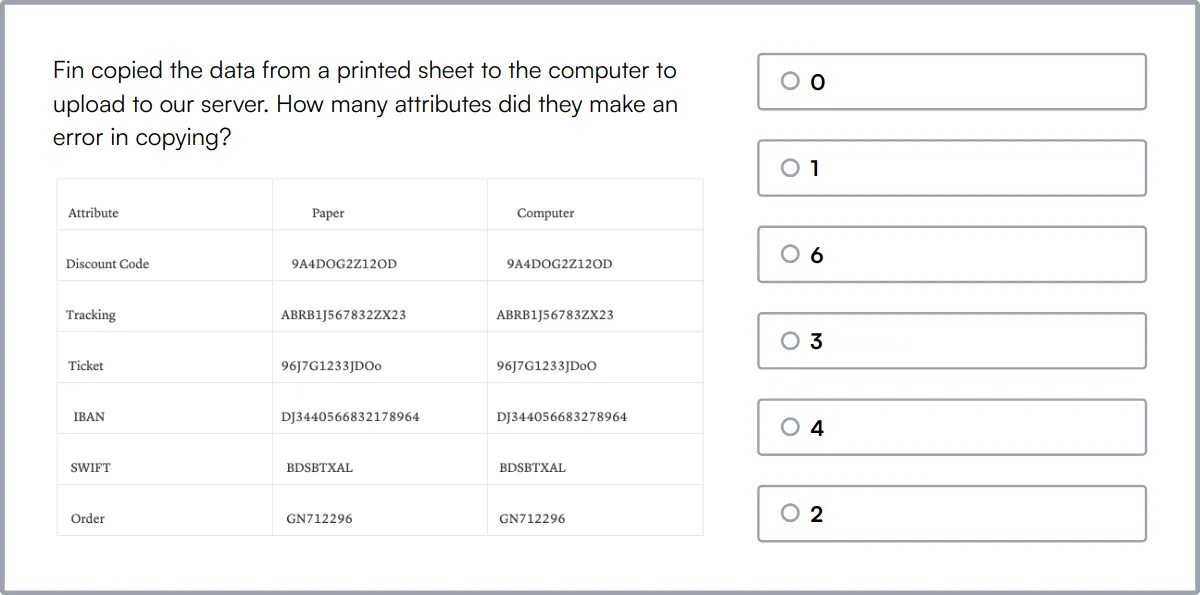
Basic Computer Skills Test
Basic Computer Skills Test evaluates a candidate's knowledge of fundamental computer skills. This test is useful for assessing candidates for roles that require basic computer proficiency.
The test covers data entry, Excel, typing, system administration, and other basic computer skills. It includes 15 multiple-choice questions that gauge a candidate's ability to navigate and use various computer applications.
High-scoring candidates demonstrate proficiency in essential computer tasks, including data entry and basic system administration.
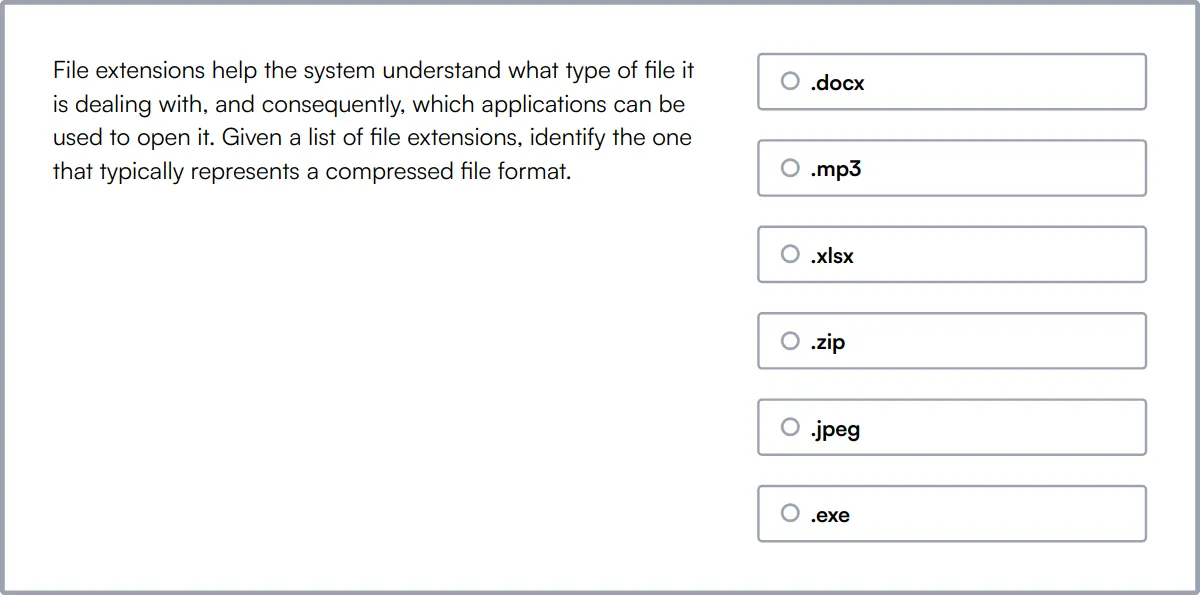
Data Entry Online Test
Data Entry Online Test evaluates candidates on their speed and accuracy in entering data into a computer system. This test is crucial for roles that require processing large volumes of data quickly and accurately.
The test assesses skills such as typing speed, accuracy, data verification, proofreading, and the ability to navigate various software applications. It includes 3 typing questions and 8 multiple-choice questions focused on attention to detail.
Candidates who perform well on this test show strong data management and quality assurance skills, ensuring accurate and efficient data entry.
Communication Skills Test
Communication Skills Test evaluates candidates' communication skills, including verbal and written communication, active listening, and interpersonal skills. This test is designed to assess their ability to effectively communicate in various professional scenarios.
The test covers situational judgement, attention to detail, critical thinking, and verbal reasoning. It includes 4 situational judgement questions, 4 communication skills questions, 4 critical thinking questions, and 4 verbal reasoning questions.
Candidates who score well on this test demonstrate strong communication abilities, critical thinking, and attention to detail, making them effective communicators in professional settings.
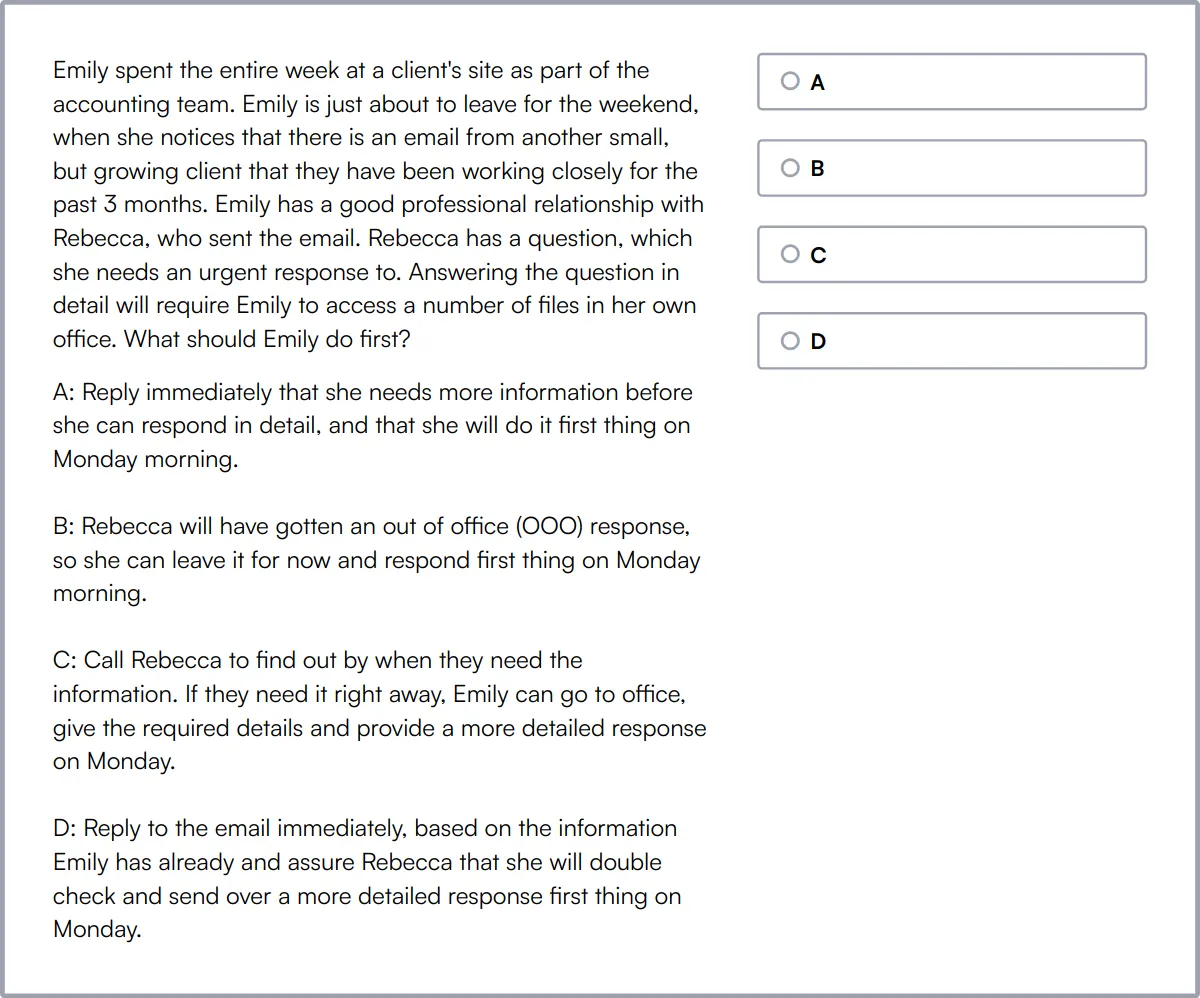
Summary: The 7 key Data Entry Clerk skills and how to test for them
| Data Entry Clerk skill | How to assess them |
|---|---|
| 1. Typing Speed | Measure words per minute and accuracy through typing tests. |
| 2. Attention to Detail | Check for errors in sample data entry tasks. |
| 3. Basic Computer Skills | Evaluate proficiency with common software and operating systems. |
| 4. Time Management | Assess ability to meet deadlines with multiple tasks. |
| 5. Data Organization | Review methods for categorizing and storing data. |
| 6. Communication Skills | Observe clarity and effectiveness in written and verbal communication. |
| 7. Confidentiality | Test understanding of data privacy and handling sensitive information. |
Data Entry Clerk Test
Data Entry Clerk skills FAQs
What is an ideal typing speed for a data entry clerk?
An ideal typing speed for a data entry clerk is typically around 40-60 words per minute. Higher speeds may be required depending on the job complexity and volume of data.
How can recruiters assess attention to detail in data entry clerks?
Recruiters can assess attention to detail by giving candidates sample data entry tasks that include deliberate errors or inconsistencies to see how many they can identify and correct.
What basic computer skills should a data entry clerk have?
A data entry clerk should be proficient with word processing tools, spreadsheets, and databases. Familiarity with email and internet research is also necessary.
Why is confidentiality important for data entry clerks?
Confidentiality is important because data entry clerks often handle sensitive information. Ensuring data privacy helps maintain trust and compliance with legal standards.
How can multitasking be assessed during the hiring process for data entry clerks?
Multitasking can be assessed by simulating a work environment where candidates handle multiple tasks simultaneously, such as data entry while responding to emails.
What are some effective time management strategies for data entry clerks?
Effective strategies include prioritizing tasks, setting deadlines, using time tracking tools, and taking regular breaks to maintain high levels of accuracy and productivity.
How important are communication skills for a data entry clerk?
Communication skills are important for understanding task requirements, clarifying information, and effectively interacting with team members and supervisors.
What role does problem-solving play in a data entry clerk’s job?
Problem-solving is crucial when dealing with data discrepancies, software issues, or unclear instructions. It helps maintain the accuracy and reliability of data.
Assess and hire the best Data Entry Clerks with Adaface
Assessing and finding the best Data Entry Clerk is quick and easy when you use talent assessments. You can check out our product tour, sign up for our free plan to see talent assessments in action or view the demo here:

40 min skill tests.
No trick questions.
Accurate shortlisting.
We make it easy for you to find the best candidates in your pipeline with a 40 min skills test.
Try for freeRelated posts
Free resources



